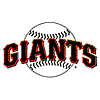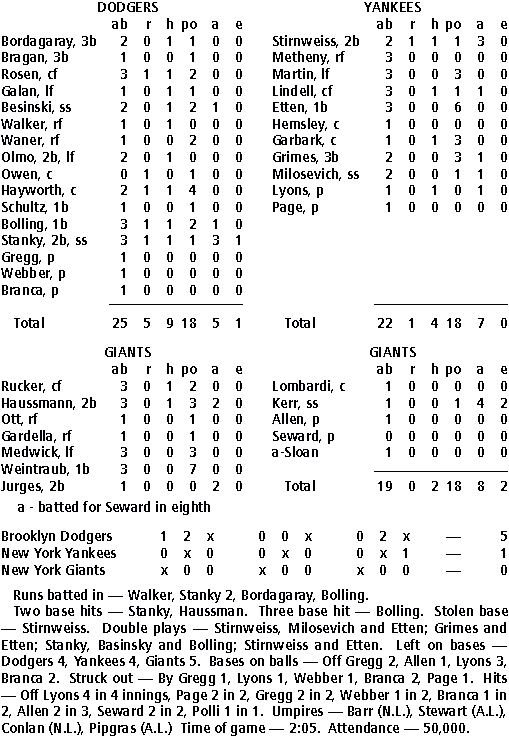


50,000 FANS SEE DODGERS TRIUMPH
Flock Tallies Five Runs to One for Yankees, None for Giants in Bond Game
BROOKLYN SCORES IN 1ST
Scores Once and Settles 3-Way Baseball Contest With Two Markers in Second



50,000 FANS SEE DODGERS TRIUMPH
Flock Tallies Five Runs to One for Yankees, None for Giants in Bond Game
BROOKLYN SCORES IN 1ST
Scores Once and Settles 3-Way Baseball Contest With Two Markers in Second
It drew a gathering of 50,000, which included 500 wounded service heroes. It helped swell New York's war bond quota by approximately $56,500,000, and it also demonstrated that no matter how much you may strive to complicate things, the Dodgers, who still insist on doing things in their own fashion, will invariably continue to find their way around.
In their six turns at bat in the nine-inning game the Flock scored five runs, the Yankees finished second with one and the Giants brought up the rear with a zero.
The game came as the climax to a long evening of entertainment, but when it arrived it came upon the spectators with bewildering speed. It consisted of the three local clubs engaging each other in a general round-robin, with each club taking a turn of sitting out for a full inning while the other two played a full inning in the field and at bat.
Opposed by the Yankees in the first inning, the Dodgers immediately got off on the right foot by clipping Al Lyons for a run on a trio of singles by Goody Rosen, Augie Galan and Dixie Walker. A little of the fun passed out for the roaring Dodger contingent at this point when the popular Dixie had to leave the field with a pulled leg muscle, but this in no way slowed down the remainder of the Flock.
In the second inning the Dodgers, now confronting the Giants with Johnny Allen on the mound, immediately tore off two more runs. A pass to Mickey Owen and a double by Ed Stanky drove in one. A single by Frenchy Bordagaray accounted for the other.
That, behind the pitching that Hal Gregg, Les Webber and Ralph Branca furnished, doubtless would have sufficed to carry the honors, but the Dodgers are never given to doing things half- way.
In the eighth, in their last turn at bat, they hammered the Giants for two more runs, with Frank Seward the victim. A single by Luis Olmo, a triple by Jack Bolling and a fly by Stanky did the mischief here. In all, the Dodgers amassed nine hits.
In the meantime, the helpless Yanks and Giants, doubtless still engrossed with trying to find out how the game is played, were getting nowhere, either against each other or against the Flock. Mel Ott's men, in fact, came up with only two hits in going down to a shut-out for their six turns at bat.
However, they also made two errors, and those misplays, both by Buddy Kerr, helped the Yanks to their lone tally in the ninth inning. The two miscues came behind a single by George Stirnweiss of Crip Polli, the third Giant pitcher to the mound. The Yanks, who themselves made only four blows, used only two hurlers, Joe Page following Lyons.
In a series of field events which preceded the baseball feature the Dodgers, always on the alert to capture the fancy of the crowd, captured the lion's share of the honors.
Calvin Coolidge McLish, 18-year-old pitcher for the Flock, won the fungo hitting contest with a drive of 416 feet 5 inches. Second prize went to Harry Feldman of the Giants with 412 feet and Rube Melton of the Dodgers placed third with an even 400 feet.
In the throwing for accuracy contest for catchers the Dodgers again emerged on top. For though none of the six backstops who took part was able to get the ball into the barrel in a peg from home plate to second base, Bobby Bragan of the Dodgers came closer than any of the others in his three tries.
In the sprint contest in which the runners raced in pairs, one starting at home plate, the other at second base, the Yankees finally flashed to the fore when their fleet George Stirnweiss defeated the Giants' Johnny Rucker, turning in the best time of 7.8 seconds.
The Dodgers, however, had the satisfaction of winning the two other heats in the event, Eddie Miskis of the Flock defeating the Giants' Buddy Kerr, while Luis Olmo outsped long-legged Johnny Lindell of the Yankees.
No baseball entertainment of any sort, of course, could be complete without the national pastime's famed clown prince, and when the ball clubs moved on the field again to take their infield practice the inimitable Al Schacht, aided by Joe Lauri Jr. was right in there to see that it was done right.
Second base, key position in many a stirring ball game, then became the stage setting for a series of musical numbers that were boisterously ushered in by Milton Berle, and following this, former Mayor James J. Walker moved on the scene as master of ceremonies to introduce a group of Greater New York's all-time diamond stars, who as they appeared in uniform received rousing cheers.
They included Zack Wheat, Nap Rucker and Otto Miller, who were Dodgers in the days, as Walker put it, "when Dodgers were known as gentlemen"; Wally Schang, Bill Dickey, now a lieutenant commander in the Navy, and Herb Pennock of the Yankees, and three Giants from away back in the early days of John McGraw: Roger Bresnahan, George (Hooks) Wiltsie and Moose McCormick.
The box scores:
